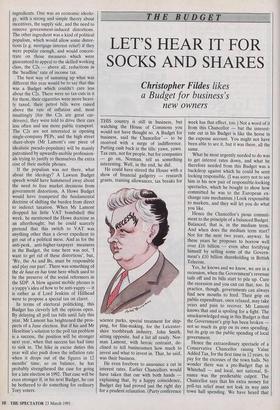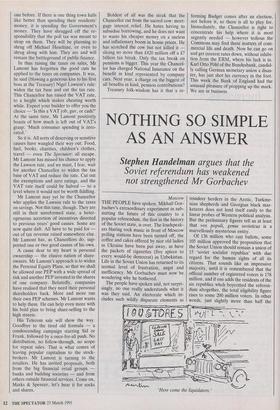THE BUDGET
LET'S HEAR IT FOR SOCKS AND SHARES
Christopher Fildes likes
a Budget for business's new owners
THIS country is still in business, but watching the House of Commons you would not have thought so. A Budget for business, said the Chancellor to be received with a surge of indifference. Putting cash back in the tills: yawn, yawn. Tax cuts, not for people, but for companies — go on, Norman, tell us something interesting. Well, in the end, he did.
He could have stirred the House with a show of financial gadgetry — research grants, training allowances, tax breaks for science parks, special treatment for ship- ping, for film-making, for the Leicester- shire toothbrush industry. John Smith, sitting opposite, had a list all ready. Nor- man Lamont, with heroic restraint, de- clined to tell businessmen how much to invest and what to invest in. That, he said, was their business.
He even forebore to announce a cut in interest rates. Earlier Chancellors would have taken that cue with both hands — explaining that, by a happy coincidence, Budget day had proved just the right day for a prudent relaxation. (Party conference week has that effect, too.) Not a word of it from this Chancellor — but the interest- rate cut in his Budget is like the horse in the expense account. You might not have been able to see it, but it was there, all the same.
What he most urgently needed to do was to get interest rates down, and what he therefore needed from this Budget was a backdrop against which he could be seen looking responsible. (I was sorry not to see him in his new pair of responsible-looking spectacles, which he bought to show how committed he was to the European ex- change rate mechanism.) Look responsible to markets, and they will let you do what you like.
Hence the Chancellor's pious commit- ment to the principle of a balanced Budget. Balanced, that is, in the medium term. And when does the medium term start? Not for the next two years, anyway. In these years he proposes to borrow well over £16 billion — even after fortifying himself by selling some of the Govern- ment's £10 billion shareholding in British Telecom.
Yes, he knows and we know, we are in a recession, when the Government's revenue tails off and its bills start to pile up. Cure the recession and you can cut that, too. In practice, though, governments can always find new mouths to feed. Their grip on public expenditure, once relaxed, may take years and pain to recover. Mr Lamont knows that and is spoiling for a fight. The unacknowledged snag in this Budget is that the Government's grip has been broken — not so much its grip on its own spending, but its grip on the public spending of local government.
Hence the extraordinary spectacle of a Conservative Chancellor raising Value Added Tax, for the first time in 12 years, to pay for the excesses of the town halls. No wonder there was a pre-Budget flap in Whitehall — and local, not national, fi- nance was the predictable culprit. The Chancellor says that his extra money for poll-tax relief must not leak its way into town hall spending. We have heard that one before. If there is one thing town halls like better than spending their residents' money, it is spending the Government's money. They have shrugged off the re- sponsibility that the poll tax was meant to strap on them. They will be planning to shrug off Michael Heseltine, or even to shrug along with him. They are and will remain the battleground of public finance.
In thus raising the taxes on sales, Mr Lamont has forgotten the good cuts he applied to the taxes on companies. It was, he said (blowing a generous kiss to his first boss at the Treasury) Nigel Lawson's rule: widen the tax base and cut the tax rate. This Chancellor has raised the VAT rate, to a height which makes cheating worth while. Expect your builder to offer you the choice — 'Is this a VAT job, guy, or cash?' At the same time, Mr Lamont positively boasts of how much is left out of VAT's grasp: 'Much consumer spending is zero- rated.'
So it is. All sorts of deserving or sensitive causes have wangled their way out. Food, fuel, books, charities, children's clothes, travel — even The Spectator: all escape. Mr Lamont has missed his chance to apply the Lawson rule, and we must, I fear, wait for another Chancellor to widen the tax base of VAT and reduce the rate. Cut out the exemptions and zero ratings, and the VAT rate itself could be halved — to a level where it would not be worth fiddling.
Mr Lamont may yet be the Chancellor who applies the Lawson rule to the taxes on savings. Not this time, though. They are still in their unreformed state, a heter- ogeneous accretion of incentives directed to previous years' good causes. Some are now quite daft. All have to be paid for — out of tax revenue raised somewhere else. Mr Lamont has, as Chancellors do, sup- ported one or two good causes of his own. A cause dear to my heart is personal ownership — the elusive nation of share- owners. Mr Lamont's approach is to widen the Personal Equity Plans, so that we shall be allowed one PEP with a wide spread of risk and another PEP invested in the shares of one company. Belatedly, companies have realised that they need their personal shareholders back. More and more run their own PEP schemes. Mr Lamont wants to help them. He can help even more with his bold plan to bring share-selling to the high streets.
His Telecom sale will show the way. Goodbye to the tired old formula — a condescending campaign starring Sid or Frank, followed by a once-for-all push. No distribution, no follow-through, no scope for repeat sales. That is what comes of leaving popular capitalism to the stock- brokers. Mr Lamont is turning to the retailers. He has invited proposals, both from the big financial retail groups — banks and building societies — and from others outside financial services. Come on, Marks & Spencer, let's hear it for socks and shares. Boldest of all was the steak that the Chancellor cut from the sacred cow: mort- gage interest relief. He hates having to subsidise borrowing, and he does not want to waste his cheaper money on a useless and inflationary boom in house prices. He has scotched the cow but not killed it — slicing no more than £420 million off a £7 billion tax break. Only the tax break on pensions is bigger. This year the Chancel- lor has charged National Insurance on the benefit in kind represented by company cars. Next year, a charge on the biggest of all benefits in kind, pension contributions?
Treasury folk-wisdom has it that a re- forming Budget comes after an election, not before it, so there is all to play for. Immediately, the Chancellor is right to concentrate his help where it is most urgently needed — however tedious the Commons may find these matters of com- mercial life and death. Now he can go on and get interest rates down, without inhibi- tion from the ERM, where his luck is in. Karl Otto Pohl of the Bundesbank, candid- ly calling German monetary union a disas- ter, has just shot his currency in the foot. This week the Bank of England had the unusual pleasure of propping up the mark. We are in business.



























































 Previous page
Previous page